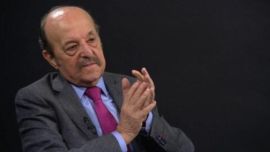US President Donald Trump solicited advice on heading off his impeachment from Republican lawmakers and confidants over the weekend, but made clear his main tactic will be publicly ratcheting up his grievances against opponents in the hope of exacting as much political damage as possible.
The approach was exemplified on Saturday, Sunday and Monday in a torrent of tweets, a video in which he attacked Democrats, and allies who defended the president’s behaviour while belittling the impeachment effort. Together, the efforts offered a preview of the approach the president plans to employ as the impeachment fight intensifies.
The whistleblower who flagged Trump’s troubling behavior “is a saboteur trying to undermine a democratically elected government,” White House senior adviser Stephen Miller told Fox News on Sunday. The inquiry “is just one of the many and unending attacks the Democrats have levelled against the president,” the senior US Republican on the House Oversight Committee, Jim Jordan of Ohio, told CNN.
The president himself tweeted Sunday that Democrats seeking “unlawful impeachment” who represent districts he won should expect to lose their jobs in the 2020 election. “We will win big!” the president said. He later demanded to meet the whistleblower and people who provided the person information, and said US House Intelligence Chairman Adam Schiff – who is leading the impeachment inquiry – should be investigated for treason and fraud.
Trump repeated some of those statements on Twitter Monday morning, suggesting that Schiff be arrested for treason and saying that he did nothing wrong in the call with the president of Ukraine. “Case closed!” he tweeted.
The 73-year-old won the White House in 2016 on a campaign built around the grievances of white, working-class voters who felt Washington had done nothing to prevent a decline in their living standards. But the approach failed him in 2018, when he tried to keep Republican control of the House by ginning up fear of criminal immigrants. Ahead of 2020, he is portraying himself as the victim, the subject of two partisan “witch hunts” to oust him, and urging his loyal base to punish his opponents at the polls.
Trump has shown he will make no effort at recompense for his conduct in a July 25 telephone call with Ukraine’s President Volodymyr Zelenskiy. After freezing military aid to Ukraine, which is battling a Russia-backed insurgency, the US president asked the Ukrainian leader to investigate a political rival, former vice-president Joe Biden, and encouraged him to work on the matter with his personal lawyer Rudy Giuliani and Attorney General William Barr.
‘We are ready’
The president’s strategy hasn’t deterred Democrats, who are pushing ahead on a schedule that could deliver articles of impeachment as early as December, even though House Speaker Nancy Pelosi herself once fretted that a backlash would benefit the president.
“We could not ignore what the president did,” Pelosi said in an interview Sunday on 60 Minutes. “I always said we will follow the facts where they take us. And when we see them, we will be ready. And we are ready.”
The White House has resisted suggestions that Trump needs to appoint an impeachment “czar” or create a “war room” to oversee a response to the inquiry. Officials say that’s unnecessary, echoing the president’s insistence that his call with Zelenskiy was “perfect.”
“You’re getting that from people who want to create an impeachment war room to either get back in or get through the front door in the first place,” senior adviser Kellyanne Conway told reporters on Friday. “Why would he do that? Who started the war here?”
One of the president’s personal attorneys, Jay Sekulow, also downplayed the need for an expanded legal team to respond to the Ukraine scandal. Sekulow said Saturday that the “team that has been in place will respond as appropriate.”
“There is no war room being established,” Sekulow said.
Conway last week was among the Trump advisers who unsuccessfully argued against publicly releasing the White House memorandum documenting Trump’s call with Zelenskiy, according to people familiar with the matter.
Familiar strategy
Trump’s Ukraine strategy is familiar to veterans of the special counsel investigation into Russian interference in the 2016 election, the allegations that Trump’s second pick for the Supreme Court, Brett Kavanaugh, engaged in sexual misconduct, or regular presidential rallies where his supporters are cast as a forgotten class oppressed by political and media elites.
The certainty of the president’s messaging offers some amount of solace to a White House grappling with how best to handle the controversy over Trump’s conduct toward Ukraine, and the threat it could pose to his presidency.
Some Trump advisers argue the Democrats’ approach is already backfiring. The president’s son, Eric Trump, tweeted that the president’s re-election campaign had raised US$8.5 million in small-dollar donations following Democrats’ announcement of the impeachment inquiry. Campaign manager Brad Parscale said the campaign and Republican National Committee (RNC) were planning a joint ad buy of US$10 million with a commercial arguing Democrats are trying to use the impeachment probe “to steal the election.”
But the president’s barrage of social media posts over the weekend – including a 23-post tweetstorm Saturday night recirculating clips from the RNC, as well as missives calling Democrats “sick” and “savages” – also revealed frustration within the West Wing.
Trump has sought input from influential conservatives to chart a path forward. Those discussions included a White House meeting Friday with National Rifle Association chief executive Wayne LaPierre and golf on Saturday with Senator Lindsey Graham, the South Carolina Republican who was one of the House managers when former President Bill Clinton was impeached in 1998 and 1999 for lying about an affair with an intern.
Bad polls
Adverse polling data may be fueling concerns in the West Wing. Some 55 percent of US citizens support the House impeachment inquiry, according to a CBS News poll released Sunday, and 42 percent say he should be removed from office. Just 36 percent said he shouldn’t be impeached.
The US president also appears concerned about losing the support of allies, and has lashed out at Republicans like Senator Mitt Romney of Utah who’ve expressed misgivings about the Zelenskiy call. While no congressional Republican has publicly backed the impeachment inquiry, a large number of Republican senators were conspicuously quiet late last week after the release of the whistleblower complaint related to the call.
The president’s concerns extend to his favourite media organisation. On Sunday, Trump posted almost two dozen messages to his Twitter account criticizing Fox News host Ed Henry for asking a guest if the president’s conduct was potentially illegal.
Keeping the Republican Party unified is particularly important for Trump, as his victimisation argument works best when it overlaps with familiar right-wing complaints: immigrants stealing the jobs of US citizens or committing crimes against them, political correctness run amok, Democratic gun-control proposals as subterfuge for the government confiscation of firearms.
There’s no similar vein for Trump to tap as he argues that it was acceptable for him to ask a foreign government to investigate a man who was at the time the front-runner to challenge his re-election. But that hasn’t stopped him from trying. Sunday evening, he issued a tweet quoting a pastor who said on Fox News that he had “never seen the Evangelical Christians more angry over any issue” than impeachment.
Democrats are “trying to stop me because I’m fighting for you,” Trump said in a video he pinned to the top of his Twitter account, while trying to link the impeachment effort to many of the familiar worries of his political base.
“The Democrats want to take away your guns, they want to take away your health care, they want to take away your vote, they want to take away your freedom, they want to take away your judges, they want to take away everything,” Trump said.
by Justin Sink, Bloomberg




















Comments